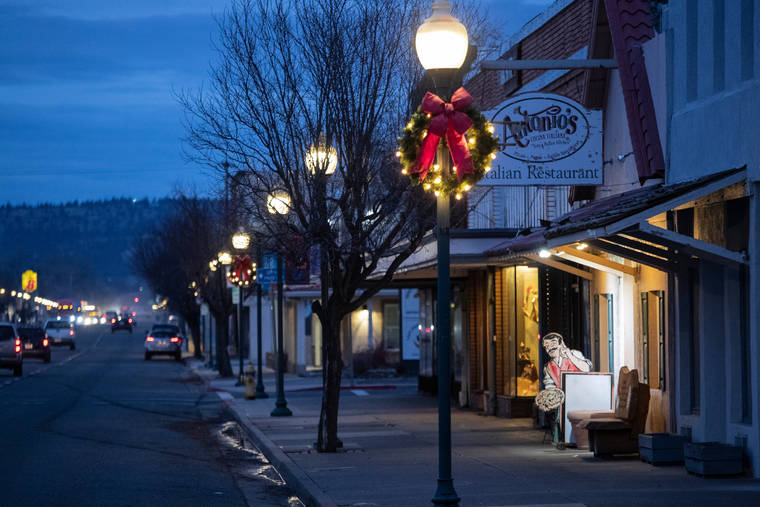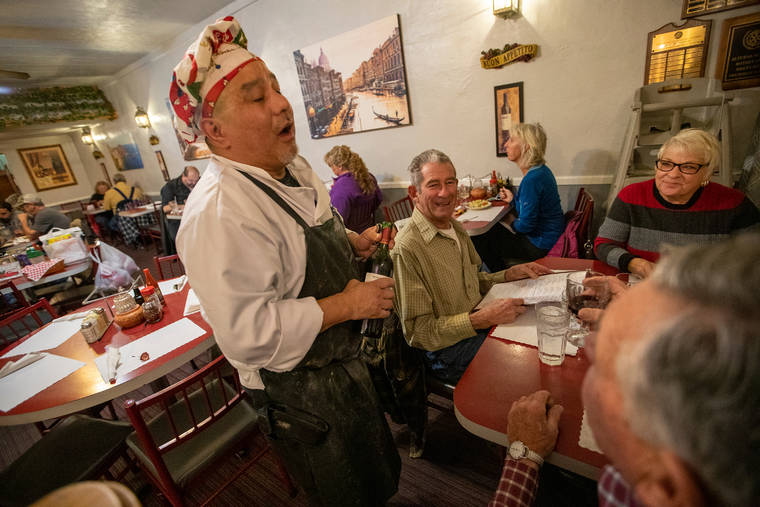ALTURAS, Calif. — At an Italian restaurant in this rural town — where deer are known to use the crosswalk because they’ve apparently learned cars will stop for painted lines — Stan Yagi pointed to three employees: one tossing, one saucing and one delivering pizzas.
“Felon. Felon. Felon,” he said.
Sandy Pickett, who has worked at the 30-year-old restaurant for 28 years, pursed her lips.
“I call them ‘co-workers.’”
The trio (bank robber, arsonist, thief) shrugged. It’s no secret that Yagi hires ex-convicts. In this northeastern corner of California, the man from Hawaii specializes in giving people a second chance.
It wasn’t something he set out to do.
Yagi had wanted to be a math teacher, but ended up owning a pizza parlor even though he hates cooking. He had found a way to make a living, but said he hadn’t found a sense of purpose. One day, about 15 years ago, he was at the restaurant, already in a foul mood, when one of his cooks — a young man with a past and a short fuse — stormed in.
A cop had hassled him on his way to work.
Yagi jumped in with advice, as he’s the first to admit he has a habit of doing.
“You have a record and you’re dressed like a hoodlum. Try wearing your work clothes walking here. Just try it,” he said.
A week later, Yagi asked the cook if the cop had stopped him again.
“Yeah,” he said. “He stopped and asked if I wanted a ride to work.”
At that moment, Yagi said, he knew that “my purpose was here in front of me, and I’d been doing it all along without realizing it.”
There aren’t a lot of job candidates in this rural town of about 2,500, and he’d had a string of employees who couldn’t get work anywhere else.
“What I learned was that a lot of these guys, they were given a bad hand at the beginning, and they could use some help to even things out,” Yagi said. “They all needed someone to teach them about life.”
Yagi originally moved to Alturas from Modesto because his “first ex-wife” was pregnant and they wanted to be near her family. (He has two exes and doubts there will be a third wife. The dating pool is small for a 54-year-old in Modoc County, he said.) The town’s welcome sign announced this was “Where the West Still Lives” — as did the sweeping plains of sage and juniper and cattle.
Still, the native Hawaiian felt a jolt of recognition.
“I was like: ‘Holy cow.’ This is how I grew up. Small town. Everybody knew everybody’s business,” Yagi said.
As a teenager, he couldn’t wait to leave. “Everybody yelling, ‘When are you going to college?’ ‘What are you going to do for work?’ ‘I know your dad!’” Yagi recalled. “But I got here and I was so happy to be home again.”
In Alturas, with a baby on the way, Yagi would have taken any job. He put college on hold (for good, it turns out), and started cooking at Pasta and Pizza. Eventually he became the principal owner and changed the name to Antonio’s Cucina Italiana — to be near the top of alphabetical listings and because Yagi likes the way people who work at Italian restaurants in the movies are like family.
On a recent weeknight, David Cheney was busy tossing dough.
He had robbed a bank when he was “young and very stupid,” he said. He was caught by the FBI and, after serving time, wound up working at Antonio’s. But two years ago he’d gotten “mad about something dumb” and told Yagi that he quit.
“It was totally misplaced anger, said Cheney, 36. “I have nothing but respect for the man. It was about so many other things.”
He found work in a sawmill, but injured his back. He’d see Yagi around town — they live on the same street — but Cheney would lower his head and say nothing.
“Finally I went to Stan and said: ‘I’m sorry. I was wrong.’ I couldn’t think of what else to say. I asked if I could ever come back. He said: ‘OK. When do you want to start?’”
On this day, Trevor Breckenridge, Antonio’s newest employee, was darting in and out a back door to grab and deliver pizzas.
When it’s his turn on the pizza line, he has a knack for tossing dough. He thinks it’s because he used to be a sign spinner — sometimes dressed as the Statue of Liberty. “It’s the same idea, different consistency,” he said.
The median income in town is about $24,000 a year; still, Breckenridge said, every customer tips well — at least at the beginning of the month. Between deliveries, he described his childhood: “I didn’t have the attention of the person who was supposed to be taking care of me,” Breckenridge said — an insight gained during a prison therapy group.
For most of his youth he shied from drugs, then tried heroin. “I went from nothing to a gram a day and places so dark I wouldn’t wish them on my worst enemy,” he said.
Breckenridge had been clean two years when he got a call saying he was a suspect in a 5-year-old arson-insurance fraud. He confessed right away. Making amends is part of recovery. He was able to see his daughter, now 5, be born before he left to serve his sentence.
“I was so grateful for that. I couldn’t have asked for more,” he said. “But then I missed the first 2 1/2 years of my daughter’s life.”
Once out, he couldn’t get a job.
He and his wife were living in a travel trailer without running water near Temecula. Their daughter was with her grandmother. He got a call from a lifelong friend who had moved north years ago and found a job at Antonio’s. He said there was a job for Breckenridge too.
It was only when his friend drove him to Alturas and made the introductions (after Yagi came to rescue them when the car broke down) that Breckenridge realized Yagi didn’t know he was coming.
“Stan looked at me standing there, just dying inside, and told me to come in for orientation the next day,” he said.
The job has given Breckenridge a stab at stability. He and his wife are about to move into a house, where their daughter will have her own room for the first time.
Being the objects of Yagi’s tough love drives some of his co-workers crazy in the moment, but they find out later he’s right, Breckenridge said.
“He’s not wrong in what he tells us. It’s just his delivery. A stern father-type thing. ‘Do this! Don’t do that!’
“But I’m a people watcher,” Breckenridge said. “So I just watch how Stan takes care of his daughter and how he is and how he made us all like family — like how an Italian restaurant is supposed to be.”
Five years ago, Yagi faced his own dark time.
He didn’t come to work one day, so Pickett and another employee went to his house. Yagi was drunk, had a gun and was threatening suicide after returning from a trip to Hawaii.
“What happened was … my father died,” Yagi said. “I didn’t tell anyone here (that he had) hung himself off the banister, and I found him.”
Yagi said that when he was young, his father was a quiet man who stressed hard work and rarely spoke to him. But the day Yagi left home, he said, his father told him: “Family means you can always come back.”
After a stay in rehab, Yagi took a course in suicide prevention. His certificate hangs on the wall in Antonio’s, near the bathrooms. He has added “Don’t be afraid to talk to someone!” to his frequent exhortations, which include “Five minutes early is on time!”
If Yagi sees his job as taking care of his employees, Pickett sees her job as managing him.
Her nickname for her boss is “the all-day sucker.”
“He doesn’t know where to draw the line,” she said. “But there is no denying, he’s changed lives.”


